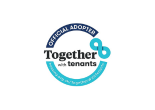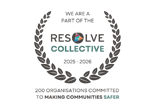We sat down with Nick, a BCHA tenant, who shared his journey with BCHA from move-on accommodation to securing a flat and becoming a voice for the customer community. His involvement in tenant engagement has been pivotal, providing essential insight to the Customer Steering Group and presenting to the BCHA Board.
Nick spoke with us about the challenges of transitional support from supported housing to general needs housing and how he has gone on to advocate for effective change on a national scale with organisations such as the National Housing Federation, Homewards (The Royal Foundation) and Shelter.
We meet Nick over coffee at short notice, grabbing him in between planning calls for his upcoming conference appearance.
So how did you first learn of and get involved with BCHA?
It all started by pure chance. I began my journey with BCHA at the end of 2019, living in move-on accommodation. I was going through a really difficult period in my life, but at least I had a roof over my head I felt like I’d been rescued in a way. After about a year, they offered me the flat where I’m living now.
While some work was being done on our flats, one of the Directors invited tenants for tea and cake to explain what the work involved. That’s where I met Chris, the Customer Engagement Manager. He was talking about the Tenant Talk magazine, and I jokingly said, “Oh, I’ll interview Lauren, our Tenancy Officer, if you like!” I’m not even sure why I said it—but that moment started everything. I joined the Tenant Talk editorial team, and it all took off from there. It’s progressed really quickly, and I’ve learned so much along the way.

Is that how you found yourself suggesting changes and ideas?
Not immediately. After about six months of learning more and more about how the BCHA works, yeah. Particularly with the transitional support from people going from supported housing to general needs housing. I met Dan (another BCHA customer) and things started really picking up. And we kind of formed the Customer Steering Group , which I think is absolutely, utterly amazing.
I asked Laura Jump (Director of Change, Transformation & Growth), you know, “Can Dan and I do a presentation to the Board on transitional support?” And she said yes. We just stood up and did it. And it was funny because they asked us, like, have you practised this? And no, we hadn’t.
These customer presentations have now become a staple of those meetings, right?
Twice a year, yeah. It’s really good, really constructive, and they've got to know us. It’s really, really important, because it's a combination of staff who are really important in those areas, and also any customers as well, and that’s co-production.
They also sent me to the National Housing Federation conference in Liverpool, as a thank-you for the work I've done. And it was two unbelievable days. It's lovely being able to tell them about the conference they sent me to, but also about updating on the steering group.
You mentioned transitions being a big focus. What did you want to communicate to the Board?
If everything goes perfect, you're on the streets, then you go into supported housing, and then you go to general needs. That should be the story. But at every transitional point, it breaks down and you often lose the support that carries you between the projects. You’re kind of left to your own devices. You know, in the worst case you might find yourself back on the street, incredibly isolated and it's stressful. That was part of our presentation to the Board.
It's the same for anyone who moves house, you've got a lot to sort out, but when you've been through possibly the roughest time of your life and suddenly you get a chance but you hit a wall with all these challenges.
A lot of our customers have got addiction problems. They've still got family problems, domestic abuse problems. You've got all this weighing on you, you're just trying to resolve your negative issues as well. It can easily become too much and you can find yourself back where you started.
That's one of the main reasons I do what I do. People that have managed to get through something so bad, but have recovered, and then are given an opportunity - we have to make sure that opportunity can’t fail. If the opportunity fails, that can be catastrophic for that person. But also, for BCHA, a waste of all that time and money.
You’ve had a chance to see how homelessness is being addressed and discussed at conferences and elsewhere.
I mean, the most amazing one was the Housing Community Summit. It was run by National Housing Federation and the Chartered Institute of Housing. It was 2,500 people, and it blew my mind. It’s over two days, you have a couple of hours in the main auditorium, and then you had fringe meetings till about three o’clock, lunch, then back in the main hall.
When I got back I said “I have to go next year”, and Laura just said to me “Why don't you apply to be a speaker?" I just started laughing. But they did, they put me down for it. I got an email through, saying we'd love to have Nick on one of the panels, which is quite a big deal, for me, anyway.
And that's not the only conference you’ve spoken at either, right?
I spoke for Shelter at the Lib Dem conference at the BIC in 2023. Shelter got in touch with Chris (Customer Engagement Manager) for people to join their ‘lived experienced group’ - which I’ve been doing for two years now, and they asked me to speak at a live demo. I’ve never liked that term, it feels like I’m being pigeon-holed, and I’m not the only one. We’ve changed the name for the group to the ‘Shelter Co-Production Partnership’ - which is exactly what it is. And we all agreed it said that much better.
The co-production group also works with MEAM (Making Every Adult Matter), which is a national group, and I’m speaking at their conference in a couple of weeks.
You’re very busy!
I keep doing it because I can start seeing differences now. The first 18 months, I was very impatient. Why don't I see anything happening? And you have got to have some patience. It’s difficult for me, because it's so important. But I have, in the last year, started seeing some very subtle changes. BCHA, I think is brilliant, and I think we're really getting there. You always keep pushing, not being over the top, but encouraging.










